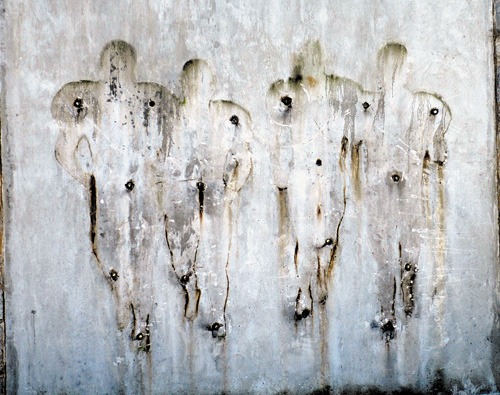NCAA SLAMS PSU


The outline of part of the famed statue of former coach Joe Paterno is visible following its removal Sunday, eliminating a key piece of the iconography surrounding the once-sainted football coach. Penn State woes continued on Monday when the NCAA leveled severe sanctions against the storied football program in the aftermath of child sex-abuse scandal and conviction of retired football assistant Jerry Sandusky.
Fine, scholarship reductions, bowl ban among sanctions
Associated Press
State College, Pa.
A potential exodus of star athletes. No hope of playing in the postseason. More than a decade of accomplishments erased from the record books. And Joe Paterno’s legacy in shreds.
Penn State football, a longtime powerhouse that was once one of the cleanest, most admired programs in college sports, escaped the so-called death penalty from the NCAA on Monday but was dealt a heavy blow that will cripple it for years to come.
The university agreed to an unprecedented $60 million fine, a four-year ban from postseason play and a cut in the number of football scholarships it can award — the price it will pay for having looked the other way while Jerry Sandusky brought boys onto campus and molested them.
The NCAA also erased 14 years of victories, wiping out 111 of Paterno’s wins and stripping him of his standing as the most successful coach in the history of big-time college football.
“Football will never again be placed ahead of educating, nurturing and protecting young people,” NCAA President Mark Emmert declared.
Penn State meekly accepted its punishment, pledging to hold itself to high standards of honesty and integrity.
Penn State spokesman David La Torre said university President Rodney Erickson had no choice but to acquiesce, given the threat of a total shutdown of the football program.
“It was clear Penn State faced an alternative — a long-term death penalty and additional sanctions for the program, university and whole community. Given the situation, he believed the sanctions offered and accepted was the appropriate and course of action,” La Torre said.
At a student union on campus, several dozen alumni and students gasped, groaned and whistled as they watched Emmert’s news conference. The news was a crushing blow to many students.
Nicole Lord, a senior, questioned why Penn State’s student body, and especially its athletes, should be punished “for the wrongs of three men and a monster.”
“They keep breaking our hearts and breaking our hearts and breaking our hearts,” she said.
Sandusky, a former member of Paterno’s coaching staff, was found guilty in June of sexually abusing 10 boys over 15 years, sometimes on campus. An investigation commissioned by the school and released July 12 found that Paterno, who died of lung cancer in January at age 85, and three other top officials at Penn State concealed accusations against Sandusky for fear of bad publicity.
The NCAA’s punishment was announced a day after the school took down a statue of Paterno that stood outside Beaver Stadium.
The sanctions will make it difficult for the Nittany Lions to compete at the sport’s highest level. Raising the specter of an exodus of athletes, the NCAA said current or incoming football players are free to immediately transfer and compete at another school.
For a university that always claimed to hold itself to a higher standard — for decades, Paterno preached “success with honor” — Monday’s announcement completed a stunning fall from grace.
Paterno’s family said in a statement that the sanctions “defame the legacy and contributions of a great coach and educator.”
“This is not a fair or thoughtful action; it is a panicked response to the public’s understandable revulsion at what Sandusky did,” the family said.
Emmert said the penalties reflect “the magnitude of these terrible acts” and also “ensure that Penn State will rebuild an athletic culture that went horribly awry.”
He said the NCAA considered imposing the death penalty, or a complete shutdown of football for a season or more, but worried about the collateral damage.
“Suspension of the football program would bring with it significant unintended harm to many who had nothing to do with this case,” Emmert said. “The sanctions we have crafted are more focused and impactful than that blanket penalty.”
Gov. Tom Corbett expressed gratitude that Penn State escaped the death penalty, saying it would have had a “severe detrimental impact on the citizens of State College, Centre County and the entire commonwealth of Pennsylvania.”
A drop-off in attendance and revenue could damage both the university, where the football team is a moneymaker that subsidizes other sports, and much of central Pennsylvania.
 43
43
